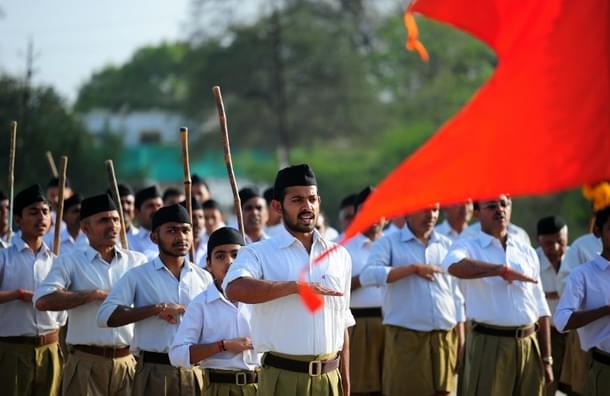Culture
From Full Pants To Gay Sex: The RSS’s Stab At Modernity
Shuma Raha
Mar 20, 2016, 02:00 PM | Updated 02:00 PM IST
Save & read from anywhere!
Bookmark stories for easy access on any device or the Swarajya app.


Last week the Rashtriya Swayamsevak Sangh (RSS) made a couple of pathbreaking fashion statements. The first was sartorial. It traded those hopelessly inelegant voluminous khaki shorts — the uniform of portly pracharaks for nearly a century — for sedate brown trousers that promise to forever hide from view the hairy legs of unfit middle-aged men in its ranks.
The second was cultural. In a complete volte-face from its long-held orthodoxy on gay sex, RSS general secretary Dattatreya Hosabale said, “Homosexuality should not be considered a criminal offence as long as it does not affect the lives of others in society.” He went on to add, “sexual preferences are private and personal…RSS has no view on that.”
Of course, the very next day Hosabale sought to dilute his
startling assertion by tweeting that though homosexuality was not a crime, it
was a “socially immoral act”. “No need to punish, but to be treated as a
psychological case.”

The LGBT community and gay rights activists will find labels
like “immoral” and “psychological case” galling. Still, Hosabale’s statement
could have important ramifications. If the RSS feels consensual gay sex should
not be a criminal offence, it means that it’s opposed to Section 377 of the
Indian Penal Code — a barbaric law that criminalises homosexuality and makes it
punishable by imprisonment for life. It could also mean that the right-wing
body, which is the ideological fountainhead of the ruling BJP and has enormous
political clout, is throwing its weight behind the roughly 2.5-million strong
LGBT community in India which is fighting to get the law scrapped.
The question is, are we to take the RSS’s statement on
homosexuality seriously? Does it stem from a genuine desire to see Section 377
read down? Or were Hosabale’s words, which were qualified by the
gays-are-immoral-psychos tag the very next day, merely a headline-grabbing
fashion statement — here today, gone tomorrow?
Section 377 is of course a legislative anachronism. It’s a
colonial era law that criminalises consensual gay sex between adults, based as
it is on the utterly archaic assumption that homosexuality is “unnatural” and
hence, immoral. It keeps thousands, nay, lakhs of LGBT people under
perennial threat of rape, torture, blackmail and extortion. In effect, it
legalises their repression and demonisation — all because they practise an alternate
sexuality.
The move to decriminalise homosexuality in India has been a case
of one step forward, two steps back. Though the Delhi High Court found the law
unconstitutional in 2009, deeming it to be a violation of the fundamental
rights to life, liberty, dignity and privacy, in 2013, a two-judge bench of the
Supreme Court overturned that judgment and upheld the law. Subsequently, the
apex court went ahead and dismissed the review petition as well.
In yet another twist in the fight to overthrow Section 377, in
February this year, the Supreme Court referred a clutch of curative petitions
against the law to a five-judge Constitution bench for an in-depth
hearing.
That’s really the last window of hope for India’s LGBT
community. For unless the judiciary takes an enlightened view of the issue and
strikes down the law, there’s little chance that Section 377 will ever be
removed from our statute books. The legislature, the other route through which
the law could be repealed, has been stubbornly opposed to decriminalising
homosexuality.
Individual lawmakers have often spoken out against the
abominable injustice caused due to Section 377— last year Finance Minister Arun Jaitley
and his predecessor P. Chidambaram, both said gay sex ought to be
decriminalised. But they are lone voices. Early this month, a Private Member’s
Bill to decriminalise homosexuality brought by Congress MP Shashi Tharoor was
defeated in the Lok Sabha.
In this general climate of homophobia, of legislators who feel
that our moral order would come unstuck if same-sex relationships between
consenting adults were to be decriminalised, Hosabale’s statement, coming as it
does from an influential body like the RSS, could have a positive and
far-reaching impact. Yes, he went on to say that homosexuality was “immoral”
and that it indicated a psychological disorder. But no one gets hurt if we keep
our moral views and judgments to ourselves. You may feel drinking is immoral.
You are perfectly within your rights to think so. But is that any reason for
the state to make the consumption of alcohol a criminal offence?
Most liberal democracies of the world have moved to legalise
homosexuality. Many countries in Europe and elsewhere permit same-sex
marriage too. Gay marriage may be too radical for India to grapple with right
now, but Section 377 is another matter. It needs to go because love, no matter
in what shape or form, can never be a criminal act.
If Hosabale meant what he said, kudos to him.





